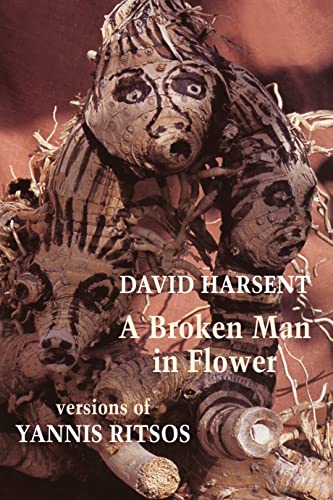First, travel was banned, then theatres and concerts. Shipsstayed at their moorings. The circus was silent, the big top empty.Out of that silence came two pint-sized clowns, day-globaggy trousers, polka-dot shirts, each with a powdered faceand painted tear. They went through their stock of sight-gagsin the middle of the road. No one laughed. The clowns weptthrough their powder, through their painted tears.That night they were taken in chains to a certain building.Next morning we woke early. The cages and wagons were gone,the big top folded and gone, the square deserted. A false beardlay under a tree. A boy put it on. He said, ‘Santa. Santa Claus.’
Locked Off
Yannis Ritsos
Translated from the Greek by David Harsent
Feature Date
- December 24, 2023
Series
- Translation
Selected By
Share This Poem
Print This Poem
David Harsent, A Broken Man in Flower: Versions of Yannis Ritsos (Bloodaxe Books, 2022)
Copyright © 2023 by David Harsent.
All rights reserved.
Reproduced by Poetry Daily with permission.

Yannis Ritsos (1909-90) is generally considered to be — along with Cavafy, Seferis and Elytis — one of the most significant Greek poets of the last century. From an early age, he was dogged by the tuberculosis that killed his mother and brother. His father and sister suffered breakdowns and spent time in institutions. During his lifetime, his poems were publicly burned by the Metaxas regime, and his books banned. Ritsos himself was repeatedly arrested and sent to prison camps, before being confined to house arrest on the island of Samos.

David Harsent has published thirteen volumes of poetry. Legion won the Forward Prize. Night was triple short-listed in the UK and won the Griffin International Poetry Prize. Fire Songs won the T.S. Eliot Prize. A Broken Man in Flower, Harsent’s versions of the poems written by Yannis Ritsos while in prison camps and under house arrest, appeared in earlier this year. A new collection, Skin, will be published in February 2024. Harsent has collaborated with several composers, though most often with Harrison Birtwistle. Birtwistle/Harsent collaborations have been performed at major venues worldwide, including the Royal Opera House, the Salzburg Festival, the Concertgebouw and Carnegie Hall. He holds a number of fellowships, including Fellow of the Royal Society of Literature and Fellow of the Hellenic Authors Society. He is Professor Emeritus at the University of Roehampton.

Hexham, Northumberland
England
"His versions are unyielding in their consistency, and the poet-translator has succeeded in finding an apt literary voice for a well-curated collection of poems… I recommend reading A Broken Man in Flower not only for its mesmerizing formalist strength and ingenuity, but for its profound importance as a document of courage and resistance against a brutally repressive regime, a testament to the quiet yet formidable might contained in the poet’s verse. In the shrunken world of the individual under both confinement and the microscope of surveillance, we watch as time cinematically slows down, and man becomes his own sole companion."
— Suzana Vuljevic, Words Without Borders
"Harsent certainly captures something vital and lasting about the work … the poems are not simply transcribed, but employ a poetic sensitivity using the materials and scaffolding of another language and idiom. But finally the work stands as a beautifully harsh indictment of militarism in Greece, and a testament to the human spirit, to artistic endeavour and the capacity for communism to instil hope and perspective when the jackboot of fascism has descended on the necks of the people."
— Chris Davis, Morning Star
"Harsent’s A Broken Man in Flower presents poems from multiple series written during Ritsos’s years of arrest under the Greek military dictatorship of 1967-74, in a prison camp on the island of Leros (June 1967-October 1968) and under house arrest on Samos (October 1968-November 1970). Ritsos was prolific, and there is a good selection here of poems about the terror of oppression and the misuse of power."
— Evan Jones, Times Literary Supplement
Poetry Daily Depends on You
With your support, we make reading the best contemporary poetry a treasured daily experience. Consider a contribution today.



